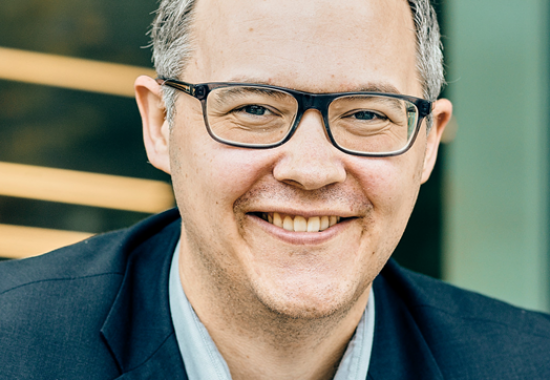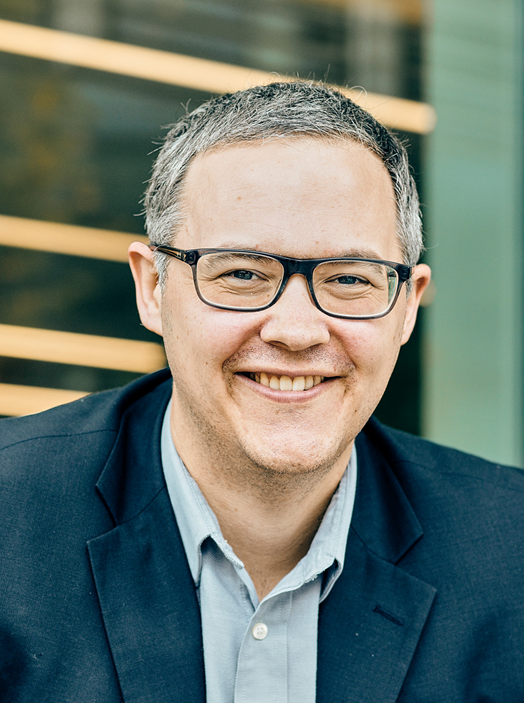Moss Rehabilitation Research Institute (MRRI) is dedicated to training the next generation of researchers in neuroscience and neurorehabilitation, and the Institute is thrilled to continue to follow the outstanding careers and achievements of former trainees. From 2014-2016, John Medaglia, PhD, completed a joint postdoctoral fellowship at MRRI and the University of Pennsylvania as part of the MRRI/Penn T32 Postdoctoral Training Program. During his time in the program, he received guidance from a variety of mentors across the two institutions. Dr. Medaglia now serves on the faculty at Drexel University and has an adjunct appointment at the University of Pennsylvania. He shares more about his career and his experiences in the T32 training program in our interview below.
1) Can you tell us more about your current position and what you are doing now?
As of Fall 2023, I’ll be an Associate Professor of Psychological & Brain Sciences at Drexel University. I spend most of my time on theoretical, basic, and applied research in cognitive neuroscience. The rest of my time is spent mentoring students and teaching courses on advanced statistics, network analysis, and neuroscience.
2) What are your research interests?
My main interest is in “controlled” cognition in humans — how our brains, histories, and environments shape our thoughts and behaviors to achieve goals. I study individual variability in the brain networks related to cognitive control, especially in the evolutionarily key frontoparietal networks. My group conducts research in healthy adults and clinical samples using techniques like brain stimulation and neuroimaging. We also conduct studies on how people make neuroethical judgments and why people have different intuitions in healthy and medical contexts.
3) Can you tell us more about the impacts or potential impacts of your research?
To date, my research has explained how brain networks mediate brain stimulation effects and individual differences in behavior. Our ongoing work could inform how brain stimulation targets are chosen. Our work on neuroethical judgments could help us to understand and guide dialogues and choices by clinicians, research subjects, and patients.
4) What first attracted you to science?
I have always been naturally curious. When I was little, I was shy, but I never stopped wondering: “why?” Late in high school, my interests shifted from engineering to psychology for personal reasons. I thought that I would eventually become an academic clinical psychologist to help people with my science and practice. Early in college, I realized that I was always more focused on how to explain mechanisms of behavior and disease and the role that the brain plays. I followed these natural interests and ended up somewhere in the middle — a psychologist with a keen interest in engineering concepts!
5) Why did you choose to work as a postdoctoral fellow at MRRI?
By late graduate school, I was coming to realize that the kind of research I wanted to do did not exist yet. It is apparently uncommon and not necessarily “in vogue” to be a person that is interested in “controlling cognitive control” using engineering ideas, so to speak. When I was looking around for postdoc positions, I found that most researchers who focused on exogenous control (in the engineering sense of the word) studied motor control systems. I was fortunate to receive joint mentorship across several faculty that allowed me to customize my training and research to develop work that was closer to my core interests in cognition.
6) What was it like working at MRRI?
I had immense freedom to explore my interests at MRRI and access to some of the best expertise and facilities in the world. Early on, I realized that I would need to learn to achieve funding to conduct my research and obtain the kind of position I wanted, and I benefitted from the collective experience of many career scientists. I was surrounded by people with adjacent interests, and I was fortunate that they supported my initiative to apply for grants and pursue unique research questions. One of the joys of being a scientist is choosing your own questions while being stimulated by new ideas and colleagues, and I found these in great abundance at MRRI. I have always been more interested in the “blind spots” between disciplines in science than anything else, and I enjoyed the opportunity to explore them at MRRI.
7) Is there something you learned at MRRI that has helped you in your current endeavors?
I learned a new level of grit, independence, initiative, and how to deal with complex issues related to basic and translational research that are unique challenges for clinical scientists. My experience and knowledge of network science and brain stimulation advanced significantly, as did my ability to seek and develop projects with colleagues and mentors. I also learned many things about the unique mixture of science and politics involved in academic and other careers.
8) What is one of your favorite memories from your time working at MRRI?
It is hard to narrow it down to one. The many spontaneous conversations I had with other postdocs became a major part of my personal and professional development. For me, one of the fun parts of science that keeps me invested is sharing it with lovely people.
9) Can you tell us more about your long-term career plans or goals?
I want to continue to better understand how humans control their behavior, and how control can be applied to brains to improve them. I consider myself very fortunate at this stage in my career. Now that I am achieving tenure and confronting new challenges, I am considering the questions that drive me the most and how I can improve my ability to answer them. In the long run, I hope that some of my work will improve the concepts that people use in psychology to think about, measure, and improve cognitive control processes in the human brain. I should admit that I do not think that all of these concepts are found in modern psychology so far. I am one of those scientists who doesn’t really consider themselves to have a “core” discipline in the traditional sense. I have always been naturally skeptical of human cultures and processes that bandwagon around specific words and ideas. On the other hand, I am aware that the risk on the other end of the spectrum is to never say anything important at all. In that case, a lot of people worry that “integrative” research is just pandering and doesn’t have any real content. Sometimes it doesn’t. Sometimes we’re just not thinking clearly enough.
10) What are some of your personal interests or hobbies?
I have less hobby time than I used to, but I’ve learned that it is part of what keeps me healthy and motivated. I became an avid disc golfer in the height of the COVID-19 pandemic and something of a throwing mechanics nerd. I have also been a long-time tabletop wargamer and still get a chance to play from time to time.



2 comment on “Meet MRRI Postdoc Alumnus John Medaglia, PhD”